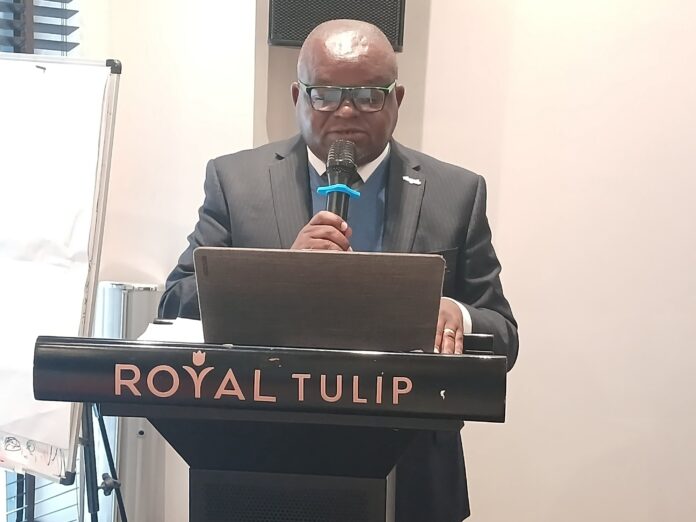
By Godfrey Ombogo
Nairobi, Kenya: Civil society organizations (CSOs) have been urged to use the upcoming Africa Climate Summit (ACS) to influence policy for the transition towards a sustainable green energy economy for the continent.
Senator John Methu, the Chairman of the Senate Standing Committee on Land Environment and Natural Resources, said Kenya and Africa bear witness to both the impacts of climate change and the immense potential for renewable energy.
The Nyandarua senator said CSOs play an indispensable role in advocating for change, raising awareness, and ensuring that the voices of the most vulnerable are heard, especially in platforms such as ACS.
“Your dedication and commitment to driving environmental sustainability have been pivotal in pushing governments, industries, and institutions towards greener practices,” he said.
“The Africa Climate Summit provides an unparalleled opportunity for our continent to come together, share knowledge, and chart a collective path towards a sustainable future.”
The lawmaker was speaking at the Civil Society Organisations Pre-ACS Workshop in Nairobi on September 1, 2023.

The workshop was convened by the Kenya Climate Change Working Group (KCCWG) in partnership with the Alliance of Civil Society Organisations for Clean Energy Access (ACCESS Coalition) under the theme, ‘The Energy Transition Landscape: Enhancing CSOs Capacity & Voice to Meaningfully Participate and Influence Africa Climate Summit Agenda’.
Methu said that as representatives of civil society, CSOs have a role to play in ensuring the summit addresses the concerns of local communities, indigenous groups, and the marginalized.
KCCWG Chairman John Kioli said energy systems play a foundational role in driving economic growth, social development, and environmental sustainability.
He said a shift towards clean, renewable energy sources not only mitigates greenhouse gas emissions but also enhances energy security, reduces air pollution, and promotes job creation.
“Regional climate weeks, such as the Africa Climate Week, provide a platform for African stakeholders to share knowledge, best practices, and experiences in, among other sectors, sustainable energy and climate action,” said Kioli.
The inaugural Africa Climate Summit takes place in Nairobi from September 4-6, 2023 under the theme, ‘Driving Green Growth and Climate Finance Solutions for Africa and the World’. The summit’s focus areas will be climate action financing, a green growth agenda for Africa, climate action and economic development, and global capital optimization.
The summit will run side by side with the Africa Climate Week 2023, which will take place from September 4-8, 2023.
According to the World Bank, only 71 percent of Kenyan households had access to electricity by 2020, against a global average of 90 percent.
The Ministry of Energy and Petroleum says 73 percent of Kenya’s electricity is generated from clean, renewable sources, mainly hydro and geothermal.
This is significantly higher than most Western countries, with the United States of America at 20 percent, the United Kingdom at 50 percent, and China at 48 percent as of 2021.
“However, about 29 percent of Kenya’s electricity comes from diesel-powered generators, which the country plans to reduce to zero by 2030 by upscaling geothermal, solar, and wind as clean power sources,” said Augustine Kenduiwo, the Deputy Director of Climate Change Directorate at the Ministry of Environment, Climate Change, and Forestry.
Kenduiwo urged civil society to hold the government to account for this commitment and many others geared towards mitigation and adaptation to climate change impacts.
“Civil society plays key roles in pushing for new laws, programmes, policies or strategies on climate change, in holding governments to account on their commitments; in identifying the lack of joined-up government responses to climate change; and in ensuring that national policy-making does not forget the poor and the vulnerable,” he said.

He noted that energy interventions will have a positive development impact only if questions of equality of access, and the benefits and costs of energy investments for poor and vulnerable groups, are addressed and accounted for in the design and delivery of services.
Separately, more than 500 African civil society organizations issued seven demands on their governments and wealthy nations ahead of the summit.
The demands are to decolonize the economy and development; repay climate debt and deliver the money; no false solutions; build global solidarity, peace, and justice; no new fossil fuels; new commitments for international cooperation; and end energy agency capture, and energy system capture.
Under the banner of ‘The Real Africa People’s Climate Summit’, the CSOs said they will hold a march on the day the summit begins in Nairobi to push their governments to “do the right thing”.
Speaking on their behalf, Hardi Yakubu from Africans Rising stated that Africans were tired of leaders and governments paying endless lip service to Africa on the impact of climate change on its people.
“We demand a decolonization of Africa’s economy and development agenda, a repayment of climate debt and delivery of much-needed money to Africa for Climate Adaptation and losses and damages, as well as real solutions to this gripping problem the continent faces,” Yakubu said.
Mohamed Adow, the Founder and Director of Senator John Methu, the Chairman Standing Committee on Land Environment and Natural Resources in Kenya’s Senate, speaks at the Civil Society Organisations Pre-ACS Workshop in Nairobi on September 1, 2023., said Africa has no mitigation responsibility and should focus its energies on finding local solutions for climate change impacts.
“We have neglected to invest in our food and energy sovereignty. So, we have to import things we can produce such as food, and this increases our public debts and weakens the value of the shilling against the dollar,” said Adow during the Africa Journalists Climate Training in Machakos last week.













